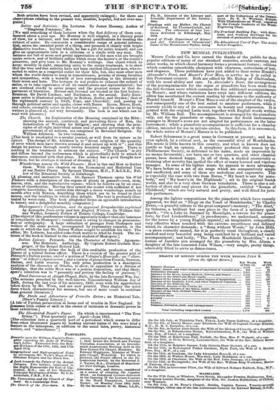NEW MUSICAL PUBLICATIONS.
Messrs. Cocks and Co. have earned the thanks of the public for their popular editions of many of our standard oratorios, secular cantatas, and other works, in which choral harmony forms a prominent feature; editions which combine remarkable cheapness with clearness, correctness of text, and elegance. These publishers have just added to their series Handers Alexander's Feast, and Mozart's First Mass, or service as it is called in this Protestant country. Both are edited by Mr. Bishop of Cheltenham, with his usual ability and care. In Alexander's Feast, the arrangement of the accompaniments for the organ or pianoforte has been made from the full German score which contains the fine additional accompaniments by Mozart ; and where variations have crept into different editions, the editor has ascertained the correct reading by reference to the authority of Handel himself. Mozart's First Maas is one of the simplest of the twelve, and consequently one of the best suited to amateur performers, while it scarcely yields to any of its successors in beauty and expression. It is printed with the original Latin text, together with English words written by Mr. William Ball. The accompaniment is arranged for the pianoforte only, not for the pianoforte or organ, because the florid instrumental passages in Mozart's score are not adapted for performance on the latter instrument ; while a pianoforte accompaniment is sufficient for a chamber edition' intended for use in private circles. In this form, it is announced, the whole series of Mozart's Masses is to be published.
Robert Schumann is a great name in Germany at present ; and he is even upheld, by a critical sect, as the successful rival of Alendelesohn. His music is little known in this country, and what is known does not justify so high an opinion. A symphony produced this season by the Philharmonic Society, in deference to his name made an impression by no means favourable ; nor have one or two quartets, and other chamber pieces, been deemed happy. In all of them, a studied eccentricity or straining after novelty has spoiled the effect of many learned and vigorous passages. In some of his lighter music he appears to more advantage. We have before us a set of six songs which are comparatively simple and unaffected, and some of them are melodious and expressive. This is especially the case with two from. Burns, "My. heart is sair for some- body," and "My heart's in the Highlands" • set to the original Scotch words, and also to a very dose German translation. There is also a col- lection of short and easy pieces for the pianoforte, entitled "Scenes, of Childhood," which are very natural and, pretty, and well fitted for juve- nile performers.
Among the lighter compositions for the pianoforte which have recently appeared, we find an "Elegy on the Tomb of Mendelssohn," by Charles Evers,—a graceful tribute to the great composer's memory; "The Alert," by Osborne, a brilliant but easy piece in the form of a military quick march ; "On a Lake in Summer by Moonlight, a reverie for the piano- forte, by Carl Lindenblauer," pseudonyme, we understand, assumed for the nonce by a young English organist,) an imaginative composition, very effective when touched with the extreme smoothness and delicacy which its character demands; a "Song without Words," by John Hills, —a piece correctly named, font is perfectly vocal throughout, a clearly marked and very beautiful song being enriched by a brilliant and varied accompaniment ; and lastly, "The Flora Macdonald Quadrilles," a 136, ledion of Jacobite airs arranged for the pianoforte by Mrs. Alison, a daughter of the late lamented John Wilson,—very simple, pretty things, admirably fitted to serve as dance-tunes.


























 Previous page
Previous page